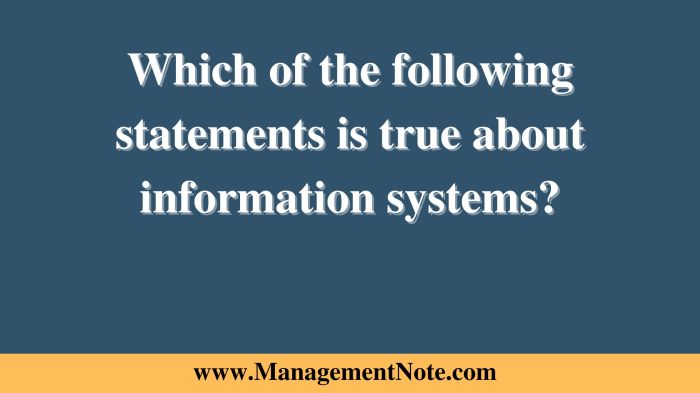Which of the following statements is true of information systems? Information systems are a vital part of any organization, providing the data and tools necessary for decision-making, streamlining operations, and improving performance. However, information systems also come with challenges and limitations that must be considered.
This article will explore the role of information systems in organizations, including their benefits, challenges, and future trends. By understanding the capabilities and limitations of information systems, organizations can harness their power to achieve their goals.
1. Define and Elaborate on Information Systems
An information system (IS) is a set of interconnected components that collect, process, store, and distribute information to support decision-making, coordination, control, analysis, and visualization in an organization.
The various components of an IS include:
- Hardware: The physical devices used to process and store information, such as computers, servers, and storage devices.
- Software: The programs that instruct the hardware what to do and how to process information, such as operating systems, database management systems, and application software.
- Data: The raw facts and figures that are processed by the IS.
- People: The individuals who use and manage the IS.
- Procedures: The policies and rules that govern the use of the IS.
Examples of real-world information systems include:
- Enterprise resource planning (ERP) systems, which integrate all aspects of a business into a single system, such as SAP and Oracle.
- Customer relationship management (CRM) systems, which help businesses manage their relationships with customers, such as Salesforce and Microsoft Dynamics.
- Supply chain management (SCM) systems, which help businesses manage their supply chains, such as SAP Ariba and Oracle Supply Chain Management.
2. Role of Information Systems in Decision-Making

Information systems play a vital role in decision-making by providing timely and accurate information to decision-makers.
The different types of decisions that information systems can help with include:
- Structured decisions: Decisions that are routine and well-defined, such as pricing decisions.
- Semi-structured decisions: Decisions that are somewhat structured but have some elements of uncertainty, such as hiring decisions.
- Unstructured decisions: Decisions that are unique and complex, such as strategic decisions.
Examples of how information systems have been used to improve decision-making include:
- Using data analysis to identify trends and patterns that can help businesses make better decisions about their products and services.
- Using simulation models to test different scenarios and make more informed decisions.
- Using expert systems to provide advice and guidance to decision-makers.
3. Information Systems and Organizational Performance

Information systems can improve organizational performance by streamlining operations, increasing efficiency, and improving decision-making.
The different ways that information systems can be used to streamline operations and increase efficiency include:
- Automating tasks, such as order processing and inventory management.
- Improving communication and collaboration, such as through the use of email and instant messaging.
- Providing access to real-time information, such as through the use of dashboards and reports.
Examples of organizations that have improved their performance through the use of information systems include:
- Walmart, which has used information systems to improve its supply chain management and reduce costs.
- Amazon, which has used information systems to create a personalized shopping experience for its customers.
- Google, which has used information systems to develop new products and services.
4. Challenges and Limitations of Information Systems: Which Of The Following Statements Is True Of Information Systems

Information systems are not without their challenges and limitations.
The potential risks and drawbacks of using information systems include:
- Security breaches, which can lead to the loss or theft of data.
- System failures, which can disrupt operations and cause financial losses.
- User errors, which can lead to incorrect decisions being made.
Examples of how information systems have failed or been misused include:
- The Equifax data breach, which exposed the personal information of over 145 million Americans.
- The Volkswagen emissions scandal, in which the company used software to cheat on emissions tests.
- The Cambridge Analytica scandal, in which the company used Facebook data to influence the 2016 US presidential election.
5. Future Trends in Information Systems

The future of information systems is bright.
Emerging trends in information systems include:
- Artificial intelligence (AI), which will be used to automate tasks, improve decision-making, and provide personalized experiences.
- Blockchain, which will be used to create secure and transparent systems.
- Cloud computing, which will provide access to computing resources on demand.
Examples of how organizations are preparing for the future of information systems include:
- Investing in AI and machine learning.
- Developing blockchain-based applications.
- Migrating to cloud-based systems.
Top FAQs
What are the benefits of using information systems?
Information systems can provide organizations with a number of benefits, including improved decision-making, streamlined operations, and increased efficiency.
What are the challenges of using information systems?
Information systems can also come with a number of challenges, including security risks, data privacy concerns, and the need for ongoing maintenance and support.
What are the future trends in information systems?
The future of information systems is expected to be shaped by emerging technologies such as artificial intelligence, cloud computing, and the Internet of Things.